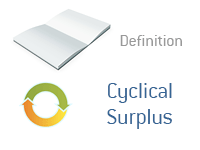Definition of Cyclical Surplus
What is the definition of the term "cyclical surplus"? What does the term "cyclical surplus" mean?
A "cyclical surplus" occurs at the top end of an economic cycle.
During periods of economic expansion, government revenues will increase as people and businesses make more money. Therefore, more taxes are being collected and government revenues increase.
 If a government collects more than what they spend, this is called a "surplus". If the surplus occurs because the economy is growing, this is known as a "cyclical surplus". If the economy is not growing, a cyclical surplus will likely turn into a cyclical deficit (a "deficit" occurs when a government spends more than what they take in).
If a government collects more than what they spend, this is called a "surplus". If the surplus occurs because the economy is growing, this is known as a "cyclical surplus". If the economy is not growing, a cyclical surplus will likely turn into a cyclical deficit (a "deficit" occurs when a government spends more than what they take in). If a government is posting surpluses regardless of how the economy is performing, this is known as a "structural surplus".
In the late 1990s, the US government posted several "cyclical surpluses" thanks to a very strong economy. Once the economy started to sag, these surpluses turned into large deficits.
--
Davemanuel.com Articles That Mention Cyclical Surplus:
None
